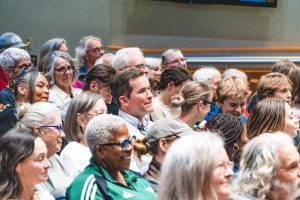It’s not a place that people tend to visit.
At the corner of East Umstead and Grant Streets sits Fayette Place. A metallic fence that’s taller than a street lamp post encloses the 20-acre site. But even from the outside, anyone can see the honey-colored grass that isn’t mowed; the clusters of crumbling red bricks that aren’t paved; the bits of trash that are carried inside by the wind or trespassers.
But Fayette Place won’t remain vacant forever. In January, the Durham Housing Authority (DHA) released its proposal to build 774 affordable housing units on the property. The ground plan features a variety of building designs: garden-style walk-ups, L-shaped low-rise apartments, a parking structure and a 2,000-square-foot retail parcel.
The City of Durham is funding this three-phase project. Five years ago, officials awarded the DHA a $4.2 million grant to purchase the land. The agreement comes with a stipulation: the city must allow the community to “contribute input in connection with the redevelopment of the site and the surrounding area.”
The housing authority claims it has done just that. But residents of the local Hayti district—encircling Fayette Place—say that the authority has not considered their feedback.
***

Speight grew up in the historic African-American neighborhood. It’s the place where he attended services at nearby Mount Vernon Baptist Church with his four sisters. It’s the place where, as a young man, he joined his father’s business, Speight’s Auto Services, at 422 Pettigrew Street. It’s the place where Speight is at home.
Speight is one of many Black entrepreneurs who form Durham’s African-American commercial heart. In the 20th century, over 200 African-American-owned businesses lined Fayetteville, Pettigrew and Pine streets in Hayti. Residents of the district want to ensure that the community’s history as a cultural and commercial hub is not forgotten.
***

Since 2017, Calhoun has lived near the Fayetteville Street corridor. Her home is an understated, yet picturesque, brick property with four bedrooms. She hopes that Hayti becomes a destination that represents Durham’s African-American history.
Yet Calhoun hasn’t had the chance, she says, to voice her aspirations to the housing authority. “They know how to contact us,” she says, shaking her head. “And they did not.”
***
Bishop Clarence Laney’s concern for the neighborhood’s history stems from his 26 years of work in the community. He currently leads a congregation of nearly 300 people at the Church of God of Prophecy. Even though services are being held over Zoom, Bishop Laney stays connected with parishioners through regular coffee chats outside of church..
The housing authority has overlooked Bishop Laney’s congregation and their feedback, he says. “The DHA has not done a good job, in my opinion, in making sure that the voices of those who live in the community are centered in this project,” he says.
Speaking via Zoom from his home office, against a backdrop of burnt-orange walls, he says he wants to see “a park or some sort of memorial, which reflects the true history and past of this community.”
***

“There is a desire to create something that would spur permanent jobs, economic opportunity, and upward mobility,” McKoy says. He pauses and reclines in his black swivel chair. The subtle motion creates a few wrinkles in his white checkered button-down.
McKoy believes the DHA should prioritize generational wealth-building because of his own upbringing. As a child, he watched his 15-year-old mother drop out of high school. McKoy stood by her, 15 years later, when she passed her General Educational Development test before she graduated from Fayetteville Technical Institute. Inspired by her, he eventually became the first person in his family to attend graduate school.
He believes that upward mobility and economic development go hand-in-hand.
He views the housing authority’s current approach to Fayette Place as nearsighted. “There’s a tendency to think,” says McKoy, “that poor African-Americans only need to be housed.”
***
When the DHA announced its purchase of Fayette Place five years ago, an optimistic buzz filled the Hayti community. The land would no longer be vacant. It could serve a purpose. It could offer affordable housing to Hayti.
“Right now, housing in Durham is getting to be not affordable,” said Calhoun. “Unaffordable. So affordable housing is a good thing.”
Yet many Hayti residents’ perception of the housing authority soured as plans for Fayette Place unfolded. Subsequent to the land acquisition,“Our next steps were going to be a planning process to determine what we would build on the site,” says the DHA’s CEO Anthony Scott.
This planning process for Fayette Place was part of the DHA Downtown Neighborhood Plan (DDNP). The plan is a comprehensive 10-year roadmap to develop mixed-income, mixed-use communities across nearly 60 acres of downtown Durham’s publicly owned land.
For each DDNP site, the housing authority ordered a market study. The Fayette Place analysis, however, delayed the site’s development. “The market study determined that the Fayette Place site was not one of the sites that we should immediately look to develop,” says Scott, “just because of the market conditions of the community—the community being the Durham community as a whole.”
Scott did not explain how the market conditions of Durham “as a whole” delayed Fayette Place’s development. Nor did his communications manager, Aalayah Sanders, respond to a follow-up email sent on March 26.
It wasn’t until January 2022 that the DHA announced the selection of its developer for Fayette Place: Durham Development Partners, a joint venture team that includes F7 International Development, Greystone Affordable Development and Gilbane Development Company. The housing authority chose Durham Development Partners over other developers, including Hayti Reborn.
A February 2022 letter released by Hayti Reborn complained that the chosen developer “came into the community and met with residents for a brief afternoon. At no time was the schematics, the plans, none of that was shared with the community prior to being selected by DHA.”
Scott, however, defends the housing authority’s community engagement at Fayette Place: “We’ve been very methodical. We spent a lot of time in getting the feedback from the community,” he says.
Scott did not say how or when the DHA connected with community members.
In March, the housing authority formally responded to Hayti Reborn. Scott wrote a five-page letter to McKoy, explaining the developer selection process. He says that Hayti Reborn received the lowest aggregate score from a selection committee. No selection criteria were specified.
A spokeswoman for the housing authority also says, via email, that “All proposers had ample opportunity to provide feedback on the selection process and DHA did not receive any concerns during the approximately 90 day solicitation period.”
McKoy is now calling upon the Durham City Council for help. He is concerned about the committee’s review process.
In an April 4 letter to “Honorable Durham City Leadership,” McKoy writes, “Hayti Reborn was the ONLY team not allowed to present its plan through interview to the DHA Review Committee prior to their selection.”
McKoy says that he’s asking for three things. First, he wants to schedule a public Durham City Council hearing. Second, McKoy is requesting a “city injunction” ordering the housing authority to pause its Fayette Place development plans until a city hearing occurs. And third, he asks that “The diverse public of Durham be allowed time and space to offer feedback to the City Council.”
At the housing authority, “you’re going to find a couple of African-Americans over there in leadership positions,” Calhoun says. Scott and several other top DHA officials are African-American.
Calhoun adds: “They ought to be ashamed of themselves.”
Above: A view of the Fayette Place site; photo by 9th Street Journal writer and photographer Chloe Hubbe. Portraits of Melvin Speight, Henry McKoy and Faye Calhoun by 9th Street Journal photographers Kulsoom Rizavi and Simran Prakash.








